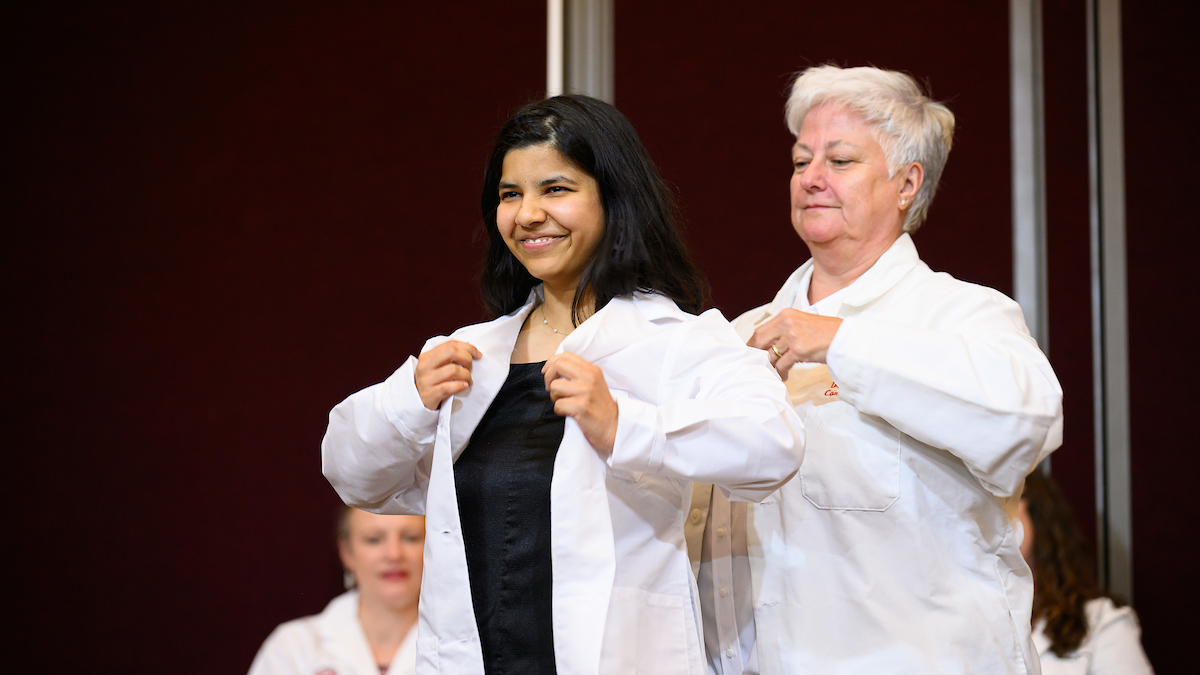New Research Center to Fight Esophageal Disease

The NC State College of Veterinary Medicine is part of an intercollegiate research team awarded a grant to develop new treatment approaches for human and animal esophageal diseases.
Anthony Blikslager, professor of equine surgery and gastroenterology at the CVM, is a co-investigator on the team, which was recently given an UNC Inter-Institutional Planning Grant to form the North Carolina Center for Esophageal Pharmacoengineering, the first of its kind in the country.
The center aims to create more effective medicine and innovative ways to directly deliver them to the esophagus. The team’s work could have a lasting impact on the treatment of esophageal cancer and also common GI disorders, including gastroesophageal reflux disease, or GERD.
Treatments vary for various esophageal conditions, but most, including diet changes and different types of medications, target the stomach, not the esophagus. Surgery and chemotherapy are the usual approaches for esophageal cancer.
“It’s blending what we know about veterinary medicine with human medicine to come up with the best possible treatments for both animals and people.”
This research team is thinking differently. Proposed pilot projects within the esophageal center include producing a drug that’s able to bind to esophageal mucosa and drug delivery platforms tailored to the esophagus. Initially, the team will develop treatments for eosinophilic esophagitis, an inflammation of esophageal tissue.
Eosinophilic esophagitis was identified just a few decades ago but is considered a major cause of digestive system illnesses.
“I think what we can do with this planning grant is say, OK, there’s one specific, relatively unknown disease we can target and go after,” said Blikslager. “But we will also think much more broadly about reflux disease and cancer. That’s going to be really big.”

Blikslager, an internationally recognized expert on gastrointestinal physiology, will provide guidance on using large animal models in the research and insight on GI disorders from nearly three-decades of experience at the CVM. Blikslager, who leads the CVM’s equine service, has long advocated for the use of large animal models in human medicine as more accurate representatives of human disease behavior. Certain large animals suffer from the same type of diseases of the esophagus as humans.
“It’s blending what we know about veterinary medicine with human medicine to come up with the best possible treatments for both animals and people,” said Blikslager.
The project is scheduled to receive the IPG funding next year. The IPG Program was launched this year to encourage collaborations among UNC System institutions and across disciplines.
David Zaharoff, associate professor in NC State and UNC-Chapel Hill’s joint Department of Biomedical Engineering, is the co-principal investigator for the project.
The team also includes co-principal investigator Evan Dellon and Nicholas Shaheen, both of the UNC School of Medicine’s Center for Gastrointestinal Biology and Disease; Soumya Benhabbour, an assistant professor at UNC’s School of Pharmacy, whose work focuses on drug delivery platforms for disease prevention; and Xiaoxin Chen a professor with North Carolina Central University’s Biomedical/Biotechnology Research Institute.
“It’s very human health driven, and along the way it will help the animals we see every day.”
The UNC Inter-institutional Planning Grant is highly competitive, with projects peer reviewed outside of North Carolina by the American Association for the Advancement of Science. Proposals are evaluated on such factors as out-of-the-box thinking and “game-changing” nature. The North Carolina Center for Esophageal Pharmacoengineering was cited by evaluators for its potential to, “lay the groundwork for potential paradigm shifts for treatment of esophageal diseases.”
“We’ll be looking at anything that could possibly go wrong with the esophagus and which doesn’t have good directly applied treatments,” said Blikslager.
According to American Cancer Society estimates, in 2017 there has been 15,690 deaths from esophageal cancer and 16,940 new cases diagnosed. GERD is much more common and is primarily caused by acid reflux, when acid from the stomach backwashes into the esophagus. It is estimated that 7 million people in the United States have some symptoms of GERD.
NC State and UNC formed the Center for Gastrointestinal Biology and Disease, or CGIBD, as a research collaborative in 1983. It is the only gastrointestinal center in the United States that has an official association with a veterinary school, said Blikslager.
Blikslager has worked to create translational health research partnerships with Triangle medical schools for 20 years, when he began working at the CVM. Just last month, Blikslager was part of a research study with other CVM colleagues and Duke University researchers using radiofrequency ablation on the esophagus of a large animal model to better understand injury and repair.
He said he hopes the new center will show how much veterinary medicine can contribute to biomedical research.
“One would hope that across the country or even across the world, if a center like this is successfully finding new ways of treating this one particular organ, maybe that will broaden to a whole host of other organs,” said Blikslager. “It’s very human health driven, and along the way it will help the animals we see every day.”
~Jordan Bartel/NC State Veterinary Medicine


